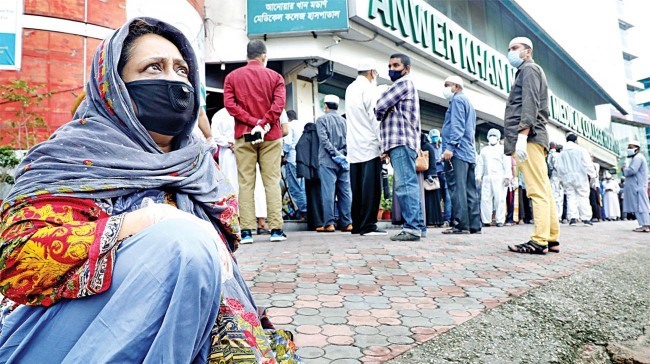Transparency International Bangladesh (TIB) surveyed 37 hospitals from 35 districts and found that 49.6 of doctors and 45.9 percent of nurses are still not getting adequate PPE and protection. Staff working in non-Covid units faced this the most.
Of the interviewees, 48.6 percent said that they are given normal surgical masks instead of K95 or other varieties.
In addition, all of the hospitals had vacant positions for doctors while 89.1 percent had empty positions for nurses, the survey found. “But no doctors have been appointed in 56.8 percent of the hospitals and no nurse for 48.5 percent of hospitals yet,” stated the report.
Over 51 percent of the hospitals reported a shortage of equipment.
These findings were revealed by the organization today, in a virtual press briefing titled “Governance Challenges in Tackling Corona Virus (Part II)”. The data was collected between June 16 and October 31, 2020.
TIB also took interviews of 1,050 people eligible for cash assistance for the poor and found that 69 percent are yet to receive anything.
In addition, 18.9 percent had to pay a bribe to get on the list, while 36.1 percent had to request a local influential figure to refer them for the list.
Over 100 people said they had to prove their political identity to get on the list.

Of those who received the money, 26.6 percent said that their mobile banking agent deducted a commission from the amount they received, according to the findings of the research. The interviewees were from 35 districts.
The organization also took 960 interviews of OMS (open market sales) cardholders, and 36.8 percent said they get less rice than they are supposed to. About 92 people said they never managed to get any rice even though they have the cards.
Of the people involved in corruption, the local MP, chairman, member, councillor or mayor were found to be involved in an overwhelming majority of the cases.
“The basic standards for transparency have not been upheld,” said Dr Iftekharuzzaman, executive director of TIB. “There is no accountability, supervision or control.”
The lists of all beneficiaries of social safety net programmes must be made open data, and published in the government websites, recommended the organization.
Over 1,000 people seeking healthcare were also interviewed and the organization found that 8.7 percent of the cases died because they did not receive healthcare on time.
More than a third neither managed to get intensive care unit (ICU) beds nor ventilators when they needed them.
The researchers pointed out that this is because of an uneven geographic distribution of critical health care.
“Most of the total ICU beds are city-centric — 310 beds are in Dhaka city (56.3 percent), and 39 beds are in Chattogram city (7 percent ). Although the COVID death rate in some divisions is higher than Dhaka, the ICU beds and ventilators are not sufficient in the proportion of the population of these divisions,” said the report.
“Because so many districts do not have ICUs or ventilators, health seekers are facing these problems,” said Md Julkarnayeen, deputy programme manager of research and policy, while presenting the findings.
As many as 43 government committees were formed to tackle the pandemic, but hardly any are functional, observed TIB.
“Such a high number of pandemic-related committees cannot be found in any other country,” stated the report.
“Most of the committees have not had any meetings yet,” it added. A large number of experts have been forcefully included in these committees without their consent, while the same person can be found in up to 4 or 5 different committees.
In addition, the committees are not listened to.
“Although there are regular meetings of the national advisory committee, the bureaucrats are taking
important decisions bypassing the committee,” said the report. They added the opening of shopping malls and the withdrawal of the shutdown as an example.
The report stated that the ineffectiveness of the committees and a lack of coordination resulted in the national plan of action for tackling Covid-19 not being implemented properly.
“As an example, we can say that a lockdown was prepared for the fourth stage. Instead, the country went into lockdown during the early days, and opened up the entire economy when the pandemic was at its fourth stage,” it said.
Photo credit: Collected
News source: The Daily Star







